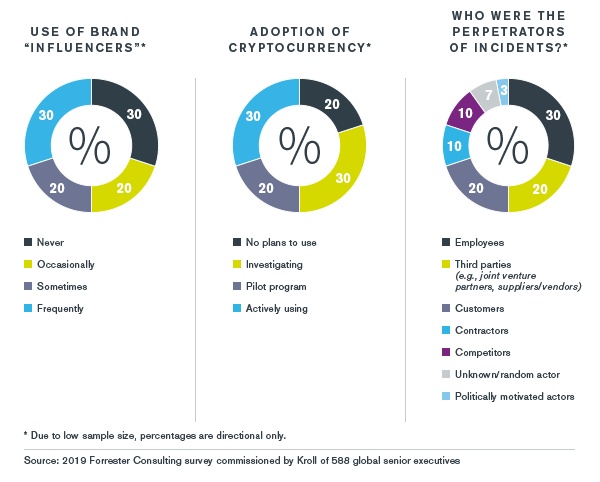Given the survey’s limited number of participants in Colombia, their responses provide only directional guidance on the country’s risk profile and its organizations’ priorities. Even so, some general insights emerge from the data. The two types of incidents most commonly experienced within the last 12 months are leaks of internal information (reported by half of respondents) and fraud by external parties (four of ten respondents); the frequency of most other threat incidents was lower (two or three of ten). Among risk priorities, however, the distinctions are more marked. Nine of ten respondents said combating adversarial social media activity and guarding against reputational damage due to third-party relationships are priorities; only four of ten make it a priority to crack down on counterfeiting. Respondents’ emphasis on social media may reflect Colombia’s steadily growing online population and the widespread use of social media there.
Colombian organizations express a high level of confidence in the ability of their compliance mechanisms to detect threats and generally agree that their companies’ behavior supports a culture of integrity. However, only six of ten respondents report that their risk management programs are designed with input from those who must comply with them—an area for possible improvement.
In four of ten cases, the threat incidents experienced by our respondents in Colombia were uncovered by the internal audit function, evidently much more important than other detection methods.

Colombia does have legislation dictating that internal mechanisms be established to prevent workplace harassment, but there is no formal whistleblowing law; survey results bear out the significance of this omission, as only 3 percent of incidents are uncovered through whistleblowing.
Respondents in Colombia have been strongly affected by geopolitical risks. Eight of ten, for example, report that a government has exerted influence on a vendor, business partner or other entity in a way that altered their organizations’ relationship with that third party. Although the high-profile trade conflicts in the headlines have not involved Colombia itself, seven of ten respondents there have been affected by new tariffs and trade wars, illustrating how easily enterprises in bystander countries can be disrupted. This issue extends into the future: Six of ten respondents in Colombia expressed concern about breakdowns of intergovernmental mechanisms for dispute resolution, free trade, combating corruption and similar issues. Other future risks, however, are of less concern: Only three of ten respondents in Colombia are concerned about the possibility of a significant financial crisis five years from now, and only four of ten cite concern over future political instability.
The Colombian government has welcomed the use of blockchain-based platforms to help fight corruption. Three of ten respondents now report actively using cryptocurrency, and fully half of respondents are either investigating cryptocurrency or have a pilot program underway, ensuring increased adoption in years to come.

